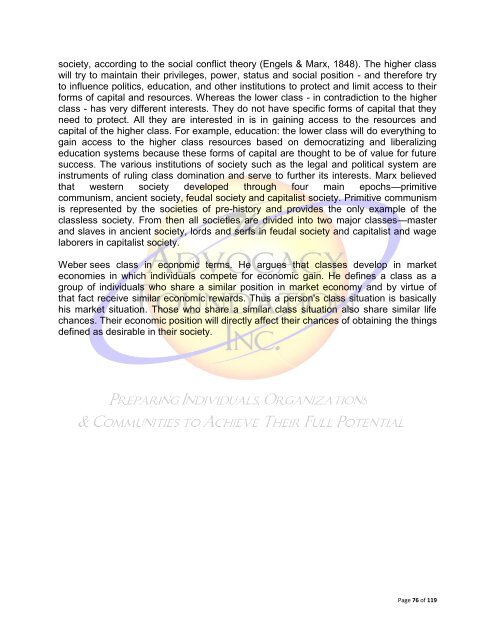International Legal Evangelism: Intelligence, Reconnaissance & Missions
International Legal Evangelism: Intelligence, Reconnaissance & Missions
International Legal Evangelism: Intelligence, Reconnaissance & Missions
You also want an ePaper? Increase the reach of your titles
YUMPU automatically turns print PDFs into web optimized ePapers that Google loves.
society, according to the social conflict theory (Engels & Marx, 1848). The higher class<br />
will try to maintain their privileges, power, status and social position - and therefore try<br />
to influence politics, education, and other institutions to protect and limit access to their<br />
forms of capital and resources. Whereas the lower class - in contradiction to the higher<br />
class - has very different interests. They do not have specific forms of capital that they<br />
need to protect. All they are interested in is in gaining access to the resources and<br />
capital of the higher class. For example, education: the lower class will do everything to<br />
gain access to the higher class resources based on democratizing and liberalizing<br />
education systems because these forms of capital are thought to be of value for future<br />
success. The various institutions of society such as the legal and political system are<br />
instruments of ruling class domination and serve to further its interests. Marx believed<br />
that western society developed through four main epochs—primitive<br />
communism, ancient society, feudal society and capitalist society. Primitive communism<br />
is represented by the societies of pre-history and provides the only example of the<br />
classless society. From then all societies are divided into two major classes—master<br />
and slaves in ancient society, lords and serfs in feudal society and capitalist and wage<br />
laborers in capitalist society.<br />
Weber sees class in economic terms. He argues that classes develop in market<br />
economies in which individuals compete for economic gain. He defines a class as a<br />
group of individuals who share a similar position in market economy and by virtue of<br />
that fact receive similar economic rewards. Thus a person's class situation is basically<br />
his market situation. Those who share a similar class situation also share similar life<br />
chances. Their economic position will directly affect their chances of obtaining the things<br />
defined as desirable in their society.<br />
Page 76 of 119

















